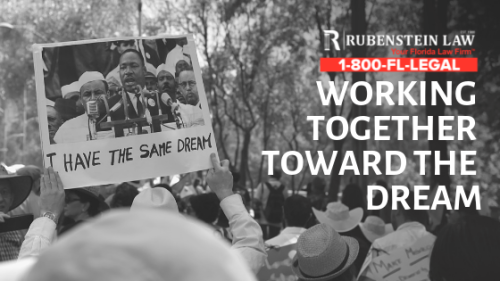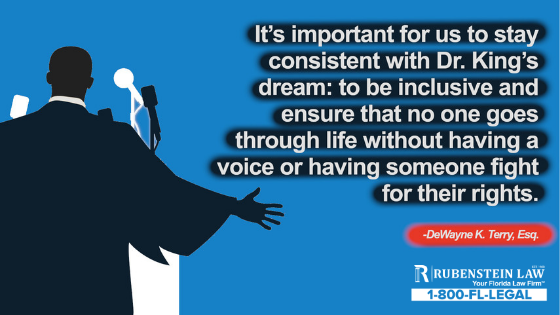Working Toward MLK’s Dream at Rubenstein Law

Written by B. Morales for Rubenstein Law
The Reverend Dr. Martin Luther King, Jr.’s famous “I Have a Dream” speech resonates deeply within us. His dream is our dream. We, too, hope that justice can linger in every corner of American society. Justice, after all, is our line of work. And like Dr. King, we believe all people–regardless of creed, race or background—have unalienable rights.
For 30 years, Rubenstein Law’s diverse team has furthered Dr. King's vision through its commitment to the community.
“The diversity of our community is our greatest strength. Supporting Dr. King’s dream of people working together for a common goal and a common good is what we do here at Rubenstein Law,” said attorney DeWayne K. Terry. “It’s important for us to stay consistent with Dr. King’s dream: to be inclusive and ensure that no one goes through life without having a voice or having someone fight for their rights.”

DeWayne, who was born and raised in Jacksonville, lived in awe of Dr. King’s legacy. Even in the 1980s, DeWayne witnessed racism spread by modern-day Ku Klux Klan members in the city. Just as Dr. King championed the status quo, reminding the world of each individual’s dignity, Dewayne has sought to live by the same principles.
“Dr. King was the iconic figure of righteousness and doing the right thing. That has been part of my moral makeup; it’s how I look at society and my fellow man.”
The firm shares these views—MLK Day is a special day for all of us. We’ll be in parades throughout the state. Keep an eye out for Rubenstein Law in parades around the state (or follow along on Instagram), and while you’re there celebrating this holiday, check out some historic landmarks listed here to learn more about Florida’s Black History.
TAMPA
- Perry Harvey Park's installations, murals and pavers tell Tampa’s black history in artistic form. It began as an effort to reshape the urban landscape in the city’s historic neighborhood. Completed in 2016, the park features one-of-a-kind sculptures, a skate park, interactive fountains and a historical timeline walkway.
- The Tampa Bay History Center’s Black History Walking Tour is a stroll through what was formerly Central Avenue, a significant road in Tampa history. Covering the history from the 1890s to 1960s, the two-hour tour on the last Saturday of each month (next one is January 26), “explores the social, political, musical and religious traditions of Black life in Tampa.”
ORLANDO
- Well’s Built Museum of African American History and Culture is named for a prominent African-American physician in Orlando in the early 20th century who established a hotel and casino for those barred by Jim Crow laws. The museum, located in the Parramore district, is on the U.S. National Register of Historic Places.
- The Zora Neale Hurston National Museum, named after the famed African-American writer whose novels depicted life in Eatonville, displays works by artists of African descent and information on the town’s history. Its goal is to educate the public on art appreciation.
BROWARD
- The African American Research Library and Cultural Center highlights the rich, cultural influence of the African Diaspora in the Americas through its collections and programs. Local African-American artists and architects, using West African inspiration, led the design. The Library houses Civil Rights-era documents, art, and collections recalling Broward’s African-American history.
- Old Dillard Museum, listed on the National Registry of Historic Places, houses galleries recounting Broward County’s African-American history. It was once a segregated school for black children where saxophonist Julian "Cannonball" Adderley directed band. Now it holds exhibitions, artifacts, and recounts the history of Fort Lauderdale’s jazz scene.
JACKSONVILLE
- The Eartha M.M. White Historical Museum, a historical landmark in Jacksonville’s LaVilla neighborhood, is one of the oldest surviving buildings of a big fire in the city. The house is a glimpse into Victorian Jacksonville and sheds light into the life of one of the city’s renaissance women.
- American Beach, in Amelia Island, is on the National Register of Historic places. Established by Florida’s first black millionaire, A.L. Lewis, it was where local African-American families vacationed.
MIAMI
- Historic Lyric Theater built in 1913 has featured stage and film performances, gospel, jazz, vaudeville, and literary arts. Today it is the home of The Black Archives History and Research Foundation of South Florida—a national resource for material reflecting the African-American experience in Miami-Dade County.
- Christ Episcopal Church, founded by Bahamian settlers in 1901, is a local architectural gem. According to South Florida influencers, Beyond South Beach, it's a significant example of immigrant craftsmanship (among others!) in the area. They rebuilt it following the 1926 hurricane, but it contains stone and local pinewood from the original structure.